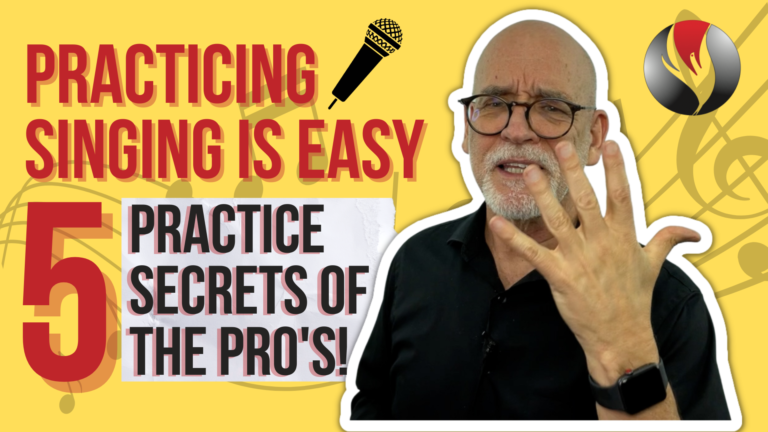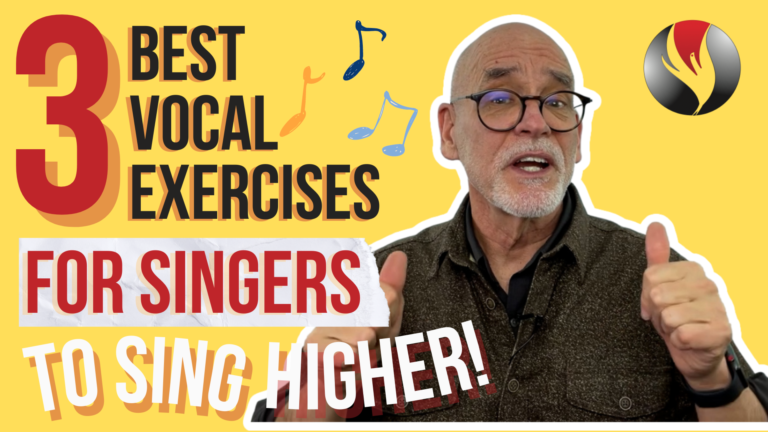If you’re a singer who wants to make money from music, singing online or in person, prepare for a mind-blowing experience.
Hi, I’m Chuck Gilmore with Power To Sing.
Part One of this three video series
In part One of this three video series I interview Paul Draper, magician, actor, singer, all around performer and most importantly, someone who’s figured out How to make money from music, singing online and in-person.
In this video you’ll learn a simple way to treat your singing like a business so you can make money immediately.
To help you start making money immediately, I’ve taken right from the video, 42 ways to Make Money Singing and put them on this PDF which you can download for free. Get it here.
Get ready to make money singing. Watch!
My Guest: Paul Draper
All right. Hi, everybody. I’m Chuck and it’s great to see you again. I have a guest with me today, Paul Draper. Paul has been on History, the A&E channel, HBO, Hallmark, Travel, HGTV. Shows like Hell’s Kitchen, Pawn Stars, Mindfreak and House Hunters.
In Vegas, he has headlined showrooms for casinos, including the Orleans Casino, Planet Hollywood, and served as house magician for seven years at the Venetian. Recently, he’s been performing shows at Disneyland for thousands of people a week at home over Zoom. It’s a privilege for me to introduce to you, Paul Draper. Paul, how are you?
Paul Draper: Hey, thanks so much for having me on. I’m excited to be on your channel.
Title of Paul’s Presentation
Chuck Gilmore: Well, Paul, I’m excited to have you. I heard you speak probably, I’m guessing, eight years ago or maybe longer to a bunch of musical theater students. You spoke on a topic that just fascinated me, and it was something along the lines of how to make money with your art. You remember the topic. What was the title of that presentation that you made?
Paul Draper: It’s a talk I give for high school theater conferences and college theater conferences called how to make a living without waiting tables. Because for most performers, they think that there are only three ways to make money. That you can be in a show, that you can teach your art, or that you can wait tables. There are thousands of things that you can do in between those two.
Chuck Gilmore: Well, you’re right. As a singer, I used to and I still almost had this mindset. It’s like, “Well, the only way I’m going to make money is go on Broadway, or go get paid for some regional theater, or perhaps go sing at a bar someplace, or a wedding.” The standard things that we think of.
I think from hearing your talk and from understanding what you’re doing, this is just the tip of the iceberg. I just want to start out by asking. How in the world have you thought up of all these different ways to monetize your art?
Paul Draper: I am variety driven. That’s the core of it is that I originally went to college to study musical theater. After working in several productions, the idea that to be a great success meant that you were cast in a show, in a role, that lasted seven or eight years on Broadway, doing that same line year, after year, after year, twice a night, six nights a week. I found that idea just really distressing. The bus and truck tour for a year, the nine months on a cruise ship, doing the same couple of shows over and over again.
For me and my way of being and where my joy comes from, that was really distressing. It wasn’t what I wanted to do. I wanted to have a wide variety of experiences in things I did, and places I went, and ways that I created art. I wanted to create new, new, new all the time. Just like we did when we were kids and a show would come up. They do four shows a year and everybody who wanted to be in it was in it and move along. The real world wasn’t like that. I wanted to capture that new show every couple of months feeling.
How can my students make money with their voice?
Chuck Gilmore: How could you help me help my students, who are wanting to be able to make a living, make money with their voice, with their singing?
Paul Draper: The start of all of this is by understanding what it is you’re selling. If we think that what we’re selling is I’m a singer who sells a song, who can sing a song, well, then we’re competing with too many people and too many things. It’s too limiting.
We have to broaden the perspective of what it is that our product is. We have to broaden the perspective of who the client is.
To start with this, I’m going to give a short business lesson. You ready for a really short business lesson?
Chuck Gilmore: Please.
Paul Draper: Here, I’m going to scoot back. Then because I’m a magician, I’m going to use playing cards.
Chuck Gilmore: Great.
Paul Draper: You can see my Perrier there. I am so bougie. Right here, I have some business card cases. The cards don’t matter. They’re just going to be placeholders to talk about a couple of strange ideas. I call this the difference between the artist’s journey and the business person’s journey. It all starts out like this, and they’re the same five steps for the artist’s journey and the business journey. They’re just reciprocal. They’re just opposite of each other. The artist says, “I am an artist. I am an artist.
That’s what I am. That’s who I am at my core, and what is my art? I’m a painter. That’s my art.” What do you paint paintings of? “I paint paintings of dead cats because it speaks to my soul and I love dead cats. I paint these very gruesome pictures of dead cats.” Where do you sell your paintings of dead cats? “Well, I go to coffee shops and they rarely want them. I go to art galleries and they say no. I go to arts’ festivals, but they’re expensive, so I have a hard time selling my paintings of dead cats.”
Who are your end buyers who buys them? “Well, a few of my friends have bought them, and some people at Horror Con have bought them, and people just don’t understand my art. I am a starving artist.” That is the artist’s journey. The business person’s journey is the exact same five steps, except for opposite. It goes like this. Who is the buyer? Who has money in the world? They have expendable money that you want to fulfill their need. Where does that buyer gather? It might not just be at art galleries and at coffee shops.
What product does that buyer want to buy? You’re a singer so you’re going to add singing as what you create and you’re the artist so you’re going to cast yourself. It looks like this. All right, car dealerships have money. Every Sunday or Saturday, they have their big car dealership sale, and they sell hot dogs, and they have balloons for the kids. They’re going to have all these different events to try and sell people on their cars. Well, if I go to the car dealerships and I tell them that I’m going to come in and sing all these fun, pop, jazz, modern, whatever songs will fit the style of the car, the Porsche, the Jaguar, the Hyundai.
What is it that you’re selling? If you’re selling a family vehicle, you’re going to go out there and sell songs from kids’ shows, and then you add singing to it. Then you cast yourself. We start with saying, “Who do I want to perform for?” This is the problem. The problem is so many of us are sitting around waiting for someone to choose us. We’re just hoping. I hope that they pick a show where they need a guy that looks like me, but I can’t just wait for that to happen. The biggest problem I have is when I went to New York and I started to audition for Broadway shows.
I would see we need a bass baritone, who’s rotund, who has a beard, who’s got a long ponytail, who does magic tricks that go, “It’s me. They’re talking about me.” I’d show up and there’d be 30 guys that looked more like me than I do, and I’d cast them to play me. Instead, this idea of where can I fulfill other people’s needs, rather than just fulfill a role in a show? Who has money that has a need? Every tech company in the world, they’re trying to fill what’s called employee engagement. They’re trying to keep their employees engaged and entertained.
They hire people to come in and do magic shows, or trick pool, or lectures, or cooking demonstrations, or foodie demonstrations, or murder mysteries, or singing. Every major group, every major corporation in the world in order to retain employees right now, is trying to do virtual shows in this current pandemic world. Since everybody on the planet is meeting virtually right now, they’re all having their morning meetings, their morning huddles, their afternoon workshops, their post get-togethers, their conferences, their trade shows, their sales meetings, they’re all online.
They could use a singer. They could use a singer, as long as that singer does more than be really uncomfortable, and then sing the song, and then turn off the camera. If you can speak just a little bit, even the littlest bit. I was talking to Bob Fitch the other day, Robert Fitch, was the original Rooster in Annie on Broadway. He did about 18 different Broadway shows. Years ago, he was advising Liza Minnelli, the singer, was helping direct one of her shows. He said she just needed little transitions, just little.
One of his favorites that they created was he said, because her mom of course, was Dorothy in the Wizard of Oz. He would have her say, “Now, I’d like to share with you a song that my mom taught me.” Then she sang a song that her mom taught her. Then she said, “But I’m going to now sing a song that I taught my mom.” Then she sang another song that was upbeat, and a different song, and a different style. That’s all the transition you need. There just needs to be a little story, a little piece, a little connection between each piece.
I’ve been working a lot during the shutdown with Broadway actors, who of course, are out of work right now. I’ve booked these retirement home shows. Every retirement home in America, in the world, has people in the rooms, they have a television screen, they have an iPad or an iPhone. If they’re a nicer, a higher end retirement home, they have a room with a big screen that they can bring people into, and they are hungry for entertainment. All of these retirement homes have a budget of $200 a day to have some engagement and entertainment for the patients.
Well, $200 isn’t enough if I have to drive to another city, and get a hotel room, and go to this retirement home to go to a show. But if I can do one at noon and one at one, and one at two, and one at three, and they can be different retirement homes in different cities, or I can have five retirement homes all come together for one virtual show. They each give their $200, and they all have the same experience, and they can see me and I can see them. I can take requests from the people in the homes.
I’ve done magic, and music, and comedy, and mindfulness exercises where I lead them through meditations, or we just talk, or we do trivia nights sometimes. I have hundreds, hundreds of retirement homes around the country that I’m presenting for every week and also, children’s hospitals. Now, children’s hospitals don’t tend to have a budget for entertainers like us. Some do. There’s a group right now called Broadway Hearts in New York. There’s a group in Las Vegas called Win-Win Entertainment. They provide entertainment for children’s hospitals in their cities and they’re paid.
The hospitals, the children’s hospitals, pay for this entertainment. They actually have a full-time person who’s on a switcher, like a TV studio, who sends them into the different rooms, introduces them but these don’t exist in cities other than Las Vegas and New York. You could start that. There’s so many ways.
When you’re taking initiative, who do you go talk to?
Chuck Gilmore: I’m guessing you don’t necessarily work through an agent for all of these different gigs. When you’re taking initiative, who do you go talk to? How are you thinking that through?
Paul Draper: Yeah. Let me respond to the agent and manager thing first, real quick. This was an idea that was given to me by a fellow named Max Maven, who’s a magician. I also thought it was brilliant. He said, “This is the buyer. They’re the opposable thumb. That’s what separates us from most other animals, that we can grip things, use tools. That’s the buyer.” They have all the power. This is what’s called via the destination management company or the event planner. The buyer, a big company, will go to an event planner to plan the event.
They’re close, they’re buddies. The event planner goes to agents. They’re the big, huge, flashy company. You see these huge, flashy agency companies. They go to the agent and say to the agent, “We need some talent.” The agent says, “What managers do I know?” They reach out to managers. The managers are closest to you. You, as the talent, are the littlest, weakest one right here. If you try and lift that pinkie on its own, the other goes with it. You have right there, you to your manager, the manager is your buddy.
Your manager isn’t like a director. This is live long and prosper. The manager is your buddy.
Your manager tells you this is what’s going on in the industry. This is what’s happening. But nobody wants to manage you unless you’re already making so much money on your own, that 20% of what you’re currently making will support another human being. If 20% of what you’re already making will not support another human being, they’ll work with someone who is because there are plenty of people out there, so waiting for a manager is wrong.
Agencies, they have drawers, and drawers, files, and files on the computer of head shots and resumes. They’re not your buddy, they’re not your friend. They only contact you if this person or this person, for some reason really wants you. The event planner doesn’t tend to know who you are. Whenever possible, I try and cut these people out and just go direct to clients. I try and go just direct to clients. Otherwise, this person may be paying $10,000 to them, and they’re paying $5,000 to them. They pay $3,000 to me, of which I have to give $600 to this person.
Now, I get $2,400 where if I did this, I’d get $10K. This idea that the manager, the agent is going to save you, it’s just not the way. If you get that big TV show on your own, you get that big Broadway show on your own, then some of these agents and managers will start to be interested, but you’re going to starve to death waiting for them to make you famous.
A lot of great stuff, right? Check now for video #2. If it’s not there, it’s coming soon. But get the 42 Ways to Make Money Singing PDF now. There’s no need to wait.
I’m Chuck Gilmore with Power to Sing. For you, make money singing can be second nature!








Responses